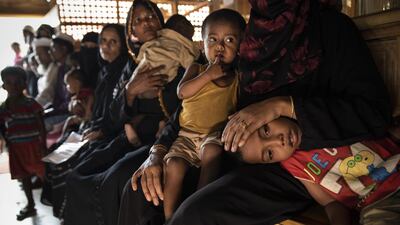Genocide: the deliberate denial of the right of existence and destruction of an entire ethnic group.
These words, drafted after the horrors of the Second World War to prevent the mass slaughter of an entire people, have been invoked in criminal courts only a handful of times since: at the International Criminal Tribunal for Rwanda, the first since the Nuremberg Trials, set up after 800,000 Tutsis and moderate Hutus were murdered in 1994; and after the slaughter of more than 8,000 Bozniaks in the Srebrenica massacre of 1995, a crime that took 22 years for its chief instigators to be brought to account.
To that ignominious list we can now add the Myanmar security forces, who, together with "certain civilians", have been accused in a UN report of killing Rohingya on a mass scale with intent.
The scale and brutality of the violence in which they raped, attacked, tortured and killed indiscriminately under the guise of “clearance operations” constituted war crimes.
The Myanmar military, or Tatmadaw, were the primary offenders, known for having an “appalling human rights record”.
The report identifies six military chiefs, including commander-in-chief Min Aung Hlaing, who should be prosecuted for the targeted attacks which led to more than 700,000 Rohingya fleeing for their lives.
The Tatmadaw have a saying: “Despite living among peacocks, crows cannot become peacocks”.
The arrogance and sheer heartlessness with which they carried out their crimes cannot go unpunished. The violence was systematic, premeditated and sustained and carried out by those who thought they were above the law. They must be held to account, and swiftly.
The lessons of past genocide trials must be learnt; their victims cannot be left malingering, waiting for justice to be done for decades.
They must see that hate crimes will not be tolerated by the global community.
The report also questioned the moral authority of Myanmar's de facto leader Aung San Suu Kyi. So far, she has shown little repentance for the crimes which took place on her watch.
The UN report states those who commit war crimes cannot go unpunished. In the case of Myanmar, that should happen sooner rather than later.

